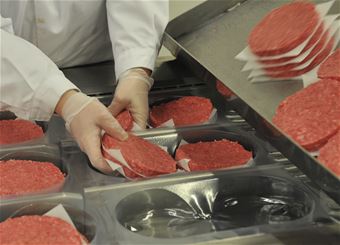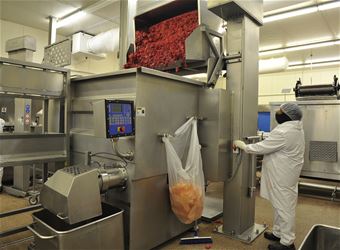
By Airman 1st Class Larissa Greatwood
86th Airlift Wing Public Affairs
Whether grilling up hamburgers during a summer barbecue or baking a pork loin for a family dinner, the Ramstein Central Meat Processing Plant has had a direct impact on the meat eaten overseas.
The Ramstein CMPP was established March 16, 1998. The Ramstein CMPP consolidated with the other original plants in Rhein-Main, Lakenheath to become the only meat processing plant to ever exist in the Department of Defense.
The Ramstein CMPP cuts, wraps, and ships over 713,000 pounds of fresh and frozen beef and pork for 35 commissaries and 18 Army and Air Force Exchange Service locations overseas.
The three locations were merged into one when the process of vacuum-packing became the most efficient, safe and cost-effective way to naturally preserve meats for a longer shelf-life. Vacuum-packing removes 99.7 percent of oxygen to prevent meat spoilage from bacteria.
“Everyone’s used to meat being sold on a foam tray where the meat is a nice red color,” said Troy Green, Defense Commissary Agency deputy plant manager. “When meat is vacuum-packed, beef especially, almost 100 percent of the oxygen is removed so it tends to have more of a brown color. When opened up and put back into contact with oxygen, you’ll get that nice red color again. So some people may think it’s not fresh, but really, it’s quite the opposite.”
The CMPP is the sole source of fresh beef and pork for commissaries throughout 11 NATO countries.
The beef is from the U.S. and the pork comes from the Netherlands. Because the beef has to be shipped from a different continent, it goes through a unique process.
“The beef we receive is from the [U.S.] and is [vacuum-sealed],” Green said. “When in transit, it’s at a stage known as wet-aging. The natural enzymes in the beef are breaking down and form a more tender cut of meat. The beef here is more tender than the beef you would buy at a commissary back in the [U.S.] because of this process.”

Once the meat arrives to the facility, it is either ground or prepared for slicing then is weighed and packaged for shipping. To ensure safety of meat products, as one of the final processes the packages go through is a metal detector.
“We have metal detection on all of our lines, though we’re only required to have it on the hamburger line,” said Green. “If even the smallest piece of metal is in a package, the machine will automatically drop it off the line.”
Lyndon Boone, Defense Commissary Agency plant manager, said the metal detectors are tested by the workers every hour to ensure they’re continuously working properly.
With many facilities depending on their shipments, the Ramstein CMPP has 81 employees, 44 of which are U.S. citizens and 37 local nationals, who work in two separate shifts to ensure production is consistent. Though they work quickly to keep their deliveries timely, they don’t skimp on any of their process as they understand the importance of a quality product.
Green said though the job can be fast-paced, the staff is hard-working and the overall morale of the environment is always high.
“Some of the employees have been here since day one, so they helped build the process,” Green said. “They take a lot of pride in what they do, and we run pretty smooth because these guys have really built this plant up and tweaked the processes to make them efficient.”
We work hard and know our job is important because we bring you the comfort of the foods you know, no matter where you are in the world, Boone said.
“While we’re overseas, we want as much home as we can get,” said Boone. “You shouldn’t wonder where your food is coming from. You should know the quality of what you’re eating, and we keep to that standard.”
With these safety and sanitary measures, the Ramstein CMPP takes out the guessing when it comes to quality. The employees take pride in providing the best product possible.
From ground beef to pork schnitzel, the CMPP offers a wide variety of meat to satisfy many preferences.
The Ramstein CMPP employees work day and night throughout the year to provide a wide variety of quality meat and without them; military members, their families and civilians throughout Europe could end up without their hamburgers and pork loins at their next barbecue.
Read the original article: http://www.ramstein.af.mil/news/story.asp?id=123467873
